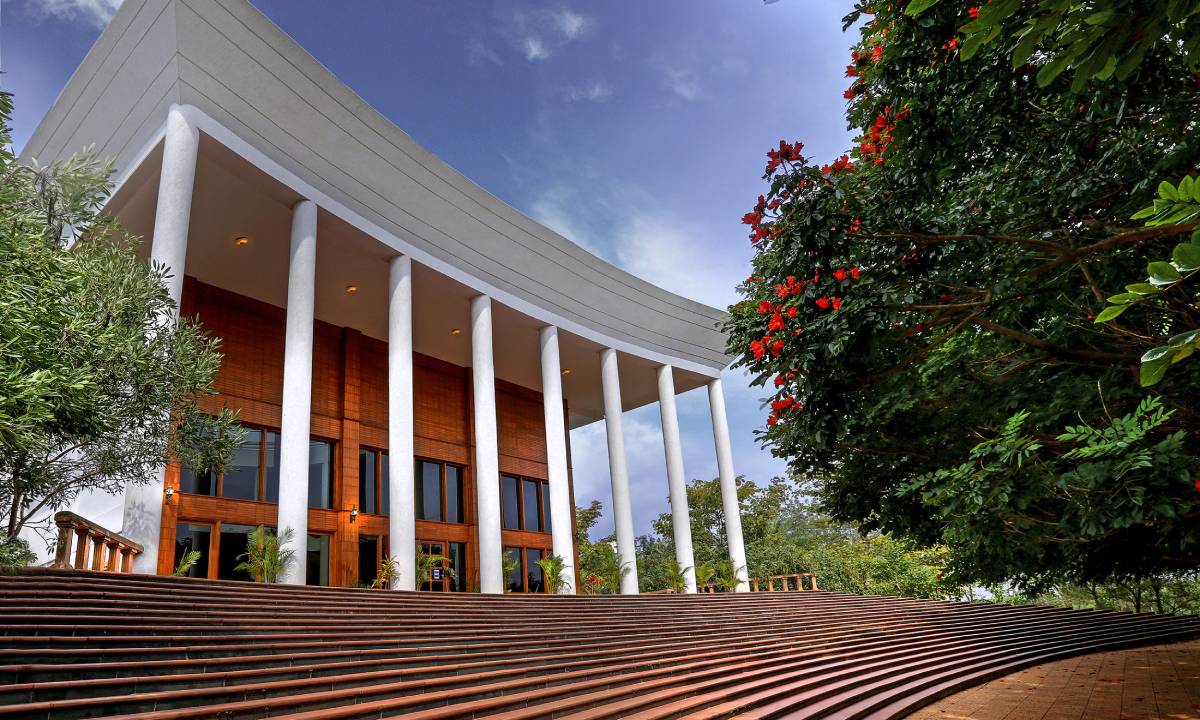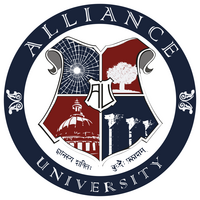Welcome to Gnanaganga – The Digital Repository of Alliance University’s Research!
The repository offers metadata for Alliance University Publications, striving to establish and maintain an archive of the University's academic contributions. It encompasses articles, book chapters, conference papers, and newspaper articles authored by faculty members at Alliance University. Additionally, it includes doctoral theses by research scholars and dissertation reports from students enrolled in various courses.
Important Links:
AU Website | AU Library Website | Library Catalogue | Remote Access | IRINS

Recent Additions
- Some of the metrics are blocked by yourconsent settings
Publication An Evaluation of the Legal Framework of Electronic Banking with Special Reference to Data Protection and Cyber Security in India(2025)This thesis presents an in-depth legal study of the evolving electronic banking (e-banking) landscape in India, with special reference to data protection and cyber security frameworks. Grounded in doctrinal methodology, the research critically examines the interplay between technological innovation in banking services and the adequacy of the legal and regulatory mechanisms that govern this transformation. Beginning with a historical overview, the study traces the evolution of India‟s banking system from informal indigenous credit systems and colonial banking institutions to the modern technology-driven financial ecosystem shaped by the 1991 LPG reforms. The research highlights how liberalisation, privatisation and globalisation catalysed the shift toward digitized financial services, enabling the emergence of core banking solutions, ATMs, internet banking, mobile applications and real-time payment systems such as UPI. These advancements brought accessibility, convenience and inclusivity but also introduced substantial legal and operational challenges, including data breaches, cyber fraud, identity theft and digital consumer vulnerability. Through detailed examination of legislative instruments such as the Information Technology Act, 2000 and the Digital Personal Data Protection Act, 2023, alongside regulatory initiatives of the Reserve Bank of India (RBI) and the National Payments Corporation of India (NPCI), the study explores the scope, efficiency and limitations of India‟s legal framework. This thesis also investigates international instruments like the Budapest Convention, OECD Guidelines and APEC Privacy Framework to provide a comparative legal perspective. It emphasizes that cyber security and data protection are not merely technical issues but integral legal imperatives for consumer trust, institutional accountability and economic stability. Further, the thesis analyses judicial interpretations and regulatory developments to evaluate how courts and agencies respond to emerging threats in digital banking. By evaluating the Indian legal framework‟s efficiency to safeguard consumers in an increasingly digitised financial environment, the study identifies gaps in enforcement, institutional infrastructure and public awareness. It recommends comprehensive legal reforms, centralized enforcement mechanisms and enhanced regulatory coordination. Ultimately, the thesis asserts that the sustainability of India‟s digital banking ecosystem depends on embedding robust legal protections for data and cyber security within a rights-based and institutionally vigilant framework. - Some of the metrics are blocked by yourconsent settings
Publication Millets! A Way to Good Health and Well-Being Among Gen Z(Springer Nature Switzerland, 2024)Although millets have long been considered a staple grain for humans, their potential in the production of poultry and animals is drawing more and more attention. The nutritional and financial advantages of adding millets to animal feed formulations are examined in this research. Rich in vital nutrients including fiber, protein, and vitamins, millets are a good substitute for traditional feed ingredients in livestock and poultry diets, giving them a well-rounded diet. Moreover, millets have qualities like drought resistance, low water requirements, and adaptability to a variety of agro-climatic situations that make them especially well-suited for sustain-able animal husbandry methods. Farmers can improve animal health, productivity, and the quality of animal products while reducing the growing prices of standard feed ingredients by incorporating millets into feed formulas. Additionally, the production of animal feed from millets increases agricultural diversification, improves food secu-rity, and strengthens the resilience of farming systems. In order to further promote the sustainable use of millets in animal feeding practices, this paper explores the potential of millets as a nutrient-dense and economically viable solution to the prob-lems facing the animal and poultry production industry. It also highlights areas for further research, policy support, and market development. - Some of the metrics are blocked by yourconsent settings
Publication - Some of the metrics are blocked by yourconsent settings
Publication Alliance University: Shaping Education for the Future(2025-07-28)Building a learning ecosystem where innovation drives knowledge, leadership and impact - Some of the metrics are blocked by yourconsent settings
Publication On the quality of altmetric data: An exploratory analysis using Benford’s Law(2023-07-05)Altmetrics, or alternative metrics, have gained a lot of popularity during last few years. It is now being explored for several purposes ranging from impact measure to research evaluation. Researchers are even exploring use of altmetrics as a proxy for societal impact of research. However, at the same time there are several studies which have cautioned about use of altmetrics on account of quality and reliability of altmetric data. This study proposes a framework to evaluate the quality of altmetric data by applying Benford Law. A large sized altmetric data sample is considered and the fits with Benford's Law are computed. Results for fit on first and second leading digit of altmetric data show adherence to Benford's Law and hence provides evidence towards authenticity of altmetric data considered. Statistical tests confirm the findings. The study suggests that Benford's Law fit can be used as a method to test the quality of altmetric data. Further, the use of a large-sized data sample is likely to reduce the impact of manipulations in altmetric data. Relevant implications of the research are discussed. © Authors. No part of this book may be reproduced in any form without the written permission of the authors © 2024 International Society for Scientometrics and Informetrics (I.S.S.I.)
Most viewed
- Some of the metrics are blocked by yourconsent settings
Publication The Role of Media, Cinema, and Literature in Professional and Vocational Development(Anukarsh - A Peer-reviewed Quarterly Magazine, 2023-06)This research article explores the role of media, cinema, and literature in fostering professional and vocational development. The study aims to investigate how these forms of expression contribute to skill acquisition, knowledge enhancement, and personal growth, ultimately shaping individuals' professional trajectories. By exploring the impact of media, cinema, and literature on various aspects of professional development, such as skill acquisition, networking, personal branding, and cultural competence, this research highlights the significance of integrating these mediums into educational and training programs. The findings of this research indicate that media, cinema, and literature play a crucial role in skill acquisition and knowledge enhancement. Through exposure to diverse narratives and perspectives, individuals develop critical thinking skills, creativity, and problem-solving abilities. Media literacy skills enable individuals to critically analyse and interpret media messages, while cinema serves as an educational tool that enhances understanding of different cultures and perspectives. Literature, on the other hand, enhances communication skills, including reading comprehension, critical thinking, and verbal expression. The implications of this research are significant for educators, trainers, and policymakers. Integrating media, cinema, and literature into educational and training programs can create a more holistic and enriching learning environment. - Some of the metrics are blocked by yourconsent settings
Publication Onset of Ideal priming approach of Professional Courses of Study(Anukarsh - A Peer-reviewed Quarterly Magazine, 2023-06)Teachers may create a stimulating learning environment where students can develop important intellectual and social skills that will benefit them for the rest of their lives by using the correct teaching strategies. A teacher can assist students with a variety of interests, talents, and learning preferences by implementing one of the available frameworks. To increase your student's chances of succeeding in the classroom, whether you work in the education sector as a teacher or another professional, you might find it helpful to learn about cutting-edge instructional practices. Teaching techniques are approaches that teachers can use to make learning easier and pique students' motivation and interest in the material. Different teaching philosophies include game-based study, differentiated study, lecture-based method, technology-based pedagogy, group and individual study, inquiry-based study, kinesthetic study, game-based study, and expeditionary study. You can enhance your methods by trying out various teaching techniques while presenting the same course, communicating with other educators to acquire their insights, and being flexible. Due to the quick changes in the modern world, the Education System is currently dealing with a wide range of problems. An excellent teaching strategy helps students overcome their preconceptions and motivates them to study by putting them in a situation where they start to believe that they are the ones who come up with the solutions and who are responsible for the change. Professors that are respected both nationally and locally serve as ideal role models for educators who are enthusiastic about effective teaching methods of professional courses, providing them with ideas, insights, and the best teaching methods.(Journal of Advances in Medical Education & Professionalism v.4(4); 2016 Oct PMC5065908) - Some of the metrics are blocked by yourconsent settings
Publication Learning of Languages for Quality Teaching in Higher Education: Realization of NEP 2020 Vision(Anukarsh - A Peer-reviewed Quarterly Magazine, 2023-06)Language is one of the most marked, conspicuous, as well as fundamental characteristics of the faculties of man. Language is a system of sounds, words, patterns, etc., used by humans to communicate thoughts and feelings. Language is a system of communication which consists of a set of sounds and written symbols which are used by the people of a particular country or region for talking or writing in. The importance of language for man and society cannot be minimized. Language is not only a mode of communication between individuals but also a way for the expression of their personality. Man is remarkably distinguished from animals not only in his use of language but also in his thought process. This use has been termed by Chomsky as “the creative aspect of language; Chomsky suggests that “the normal use of language is innovative, in sense that much of what we say in the course of normal language use is entirely new, not a reception of anything that we have heard before and not even “similar” in “pattern” to sentences or discourse that we have heard in the past” (Chomsky, p.10). Language has its true being in conversation in the exercise and promotion and understanding between peoples. Language should not be a means to impose or transmit my will to another. Above all, language is a living process in which a community of life is lived out. It should be thought that human language as a special and unique living process, in that in linguistic communication, world and human worldview is disclosed. This disclosure, this function of language means that language does not draw attention to itself but transparent to the realities that are manifested through it. Since learning a language is part of our knowledge, it becomes one of the key factors in competitiveness. In the advanced industrial society of today, the basic knowledge of a single or more language has become indispensable. - Some of the metrics are blocked by yourconsent settings
Publication बंगाल कला शैली में कलाकारों के संयोजन शक्ति एवं स्वतंत्रता आन्दोलन में सहभागिता...(Anukarsh - A Peer-reviewed Quarterly Magazine, 2023-06) - Some of the metrics are blocked by yourconsent settings
Publication 'राष्ट्रीय शिक्षा नीति- 2020' के आलोक में भारतीय भाषा और व्यावसायिक शिक्षा...(Anukarsh - A Peer-reviewed Quarterly Magazine, 2023-06)
